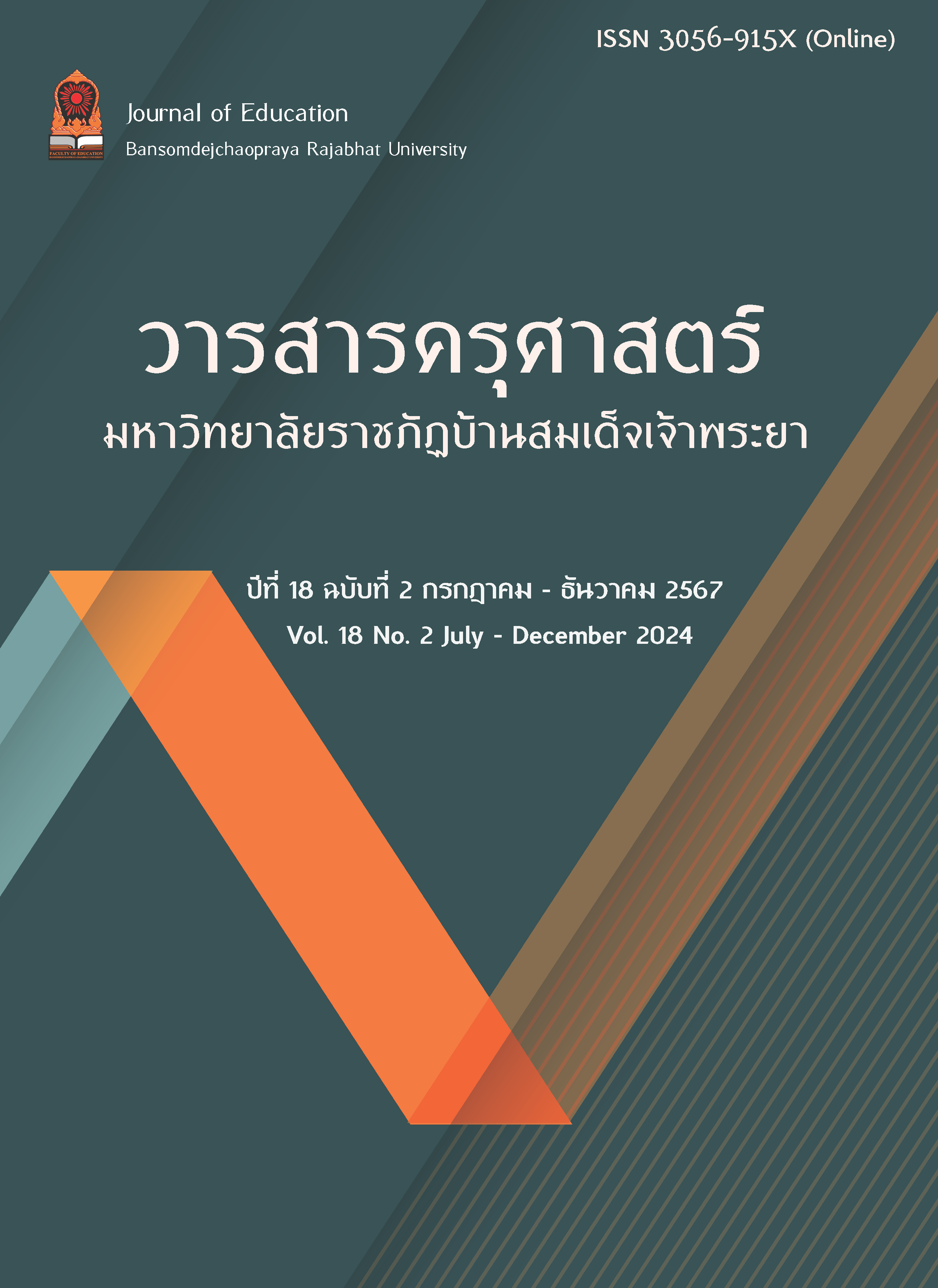Model for developing teachers' learning management to promote moderation, reasonableness and good immunity of students
Keywords:
Keyword: learning management , promote moderation, reasonablenessAbstract
Model for developing teachers' learning management to promote moderation, reasonableness and good immunity of students. The purpose of the research were to 1. Analyze the conditions and needs for developing teachers' learning management. 2. Develop a model for developing teachers' learning management 3. Study the results of using the learning management development model of teachers. The group of co-researchers consists of 2 educational institution administrators, 27 teachers, 15 basic education committee members, and 20 students' parents. There were 4 research instruments: a questionnaire, an evaluation, a form of supervision for the development of teachers' learning management, and an interview Data analysis used percentages, means, standard deviations and content analysis.
The research results found that the research results found that 1. Conditions and needs in the development of teacher learning management to promote moderation, reasonableness and good immunity. There were main components and indicators of success in developing as follows:1) Development of school curriculum 2) Management of teacher learning to promote moderation, using participatory action research.
2. Models for developing teacher learning management to promote moderation, reasonableness, and good immunity. Consists of practical training, lesson learned, workshop training, exchange of knowledge and study visits
3. Results of developing teachers' learning management to promote moderation, reasonableness and good immunity. It was found of had the highest level of overall performance and achieved results with a high level all aspects.
Downloads
References
กระทรวงศึกษาธิการ. (2557). แนวทางการบริหารศูนย์สถานศึกษาแบบพอเพียง. กรุงเทพฯ : ศูนย์พอเพียง.
กระทรวงศึกษาธิการ. (2560). การศึกษาข้อมูลทิศทางและกรอบยุทธศาสตร์ของแผนพัฒนาเศรษฐกิจและสังคมแห่งชาติ ฉบับที่ 12 (พ.ศ. 2560 – 2564). กรุงเทพฯ : กระทรวงศึกษาธิการ.
กระทรวงศึกษาธิการ. (2560). แผนพัฒนาเศรษฐกิจและสังคมแห่งชาติ ฉบับที่ 12 (พ.ศ. 2560 – 2564). กรุงเทพฯ : กระทรวงศึกษาธิการ.
คณะทำงานบูรณาการเศรษฐกิจพอเพียงสู่การเรียนการสอน. (2558). การเรียนรู้ปรัชญาของเศรษฐกิจพอเพียงเพื่อทดลองใช้สำหรับช่วงชั้นที่ 3 (ระดับ มัธยมศึกษาปีที่ 1-3). กรุงเทพฯ : กระทรวงศึกษาธิการ.
คณะอนุกรรมการขับเคลื่อนเศรษฐกิจพอเพียง. (2558). การสร้างขบวนการขับเคลื่อนเศรษฐกิจพอเพียง. กรุงเทพฯ : สำนักงานคณะกรรมการพัฒนาเศรษฐกิจ และสังคมแห่งชาติ.
คณะรัฐมนตรี. (2560). รัฐธรรมนูญแห่งราชอาณาจักรไทย พุทธศักราช 2550. กรุงเทพฯ : สถาบันพระปกเกล้า. บุญชม ศรีสะอาด. (2545). การวิจัยเบื้องต้น. พิมพ์ ครั้งที่ 7. กรุงเทพฯ : สุวีริยาสาส์น.
สำนักงานขับเคลื่อนการพัฒนาตามปรัชญาของเศรษฐกิจพอเพียง. (2557). แนวคิดพื้นฐานการดำเนินชีวิตตามหลักปรัชญาเศรษฐกิจพอเพียง. กรุงเทพฯ : ศูนย์สถานศึกษาพอเพียงมูลนิธิสถิรคุณ.
สำนักงานคณะกรรมการการศึกษาขั้นพื้นฐาน.(2561). ยุทธศาสตร์การพัฒนาประเทศ : แผนพัฒนาเศรษฐกิจและสังคมแห่งชาติ ฉบับที่ 10 (พ.ศ. 2550 - 2554). กรุงเทพฯ : สำนักงานคณะกรรมการการศึกษาขั้นพื้นฐาน.
สำนักงานคณะกรรมการพัฒนาเศรษฐกิจและสังคมแห่งชาติ. (2560). แผนพัฒนาแผนพัฒนาเศรษฐกิจ และสังคมแห่งชาติฉบับที่ 12 (พ.ศ.2560 – 2564). กรุงเทพฯ : สำนักงานคณะกรรมการพัฒนาเศรษฐกิจและสังคมแห่งชาติ.
สำนักงานเลขาธิการกระทรวงศึกษาธิการ. (2560). ยุทธศาสตร์การพัฒนาคุณภาพการศึกษา : ระเบียบวาระแห่งชาติ (พ.ศ. 2551-2555) ที่สอดคล้องกับแผนการศึกษา แห่งชาติ (พ.ศ. 2545-2559). กรุงเทพฯ : พริกหวานกราฟฟิก.
Kemmis, S & McTaggart, R. (1988). The Action Research Planer (3rd ed.). Victoria: Deakin University.
Downloads
Published
How to Cite
Issue
Section
License
Copyright (c) 2024 Faculty of Educaion Bansomdejchaopraya Rajabhat University

This work is licensed under a Creative Commons Attribution-NonCommercial-NoDerivatives 4.0 International License.
บทความที่ได้รับการตีพิมพ์เป็นลิขสิทธิ์ของคณะครุศาสตร์ มหาวิทยาลัยราชภัฏบ้านสมเด็จเจ้าพระยา
ข้อความที่ปรากฏในบทความแต่ละเรื่องในวารสารวิชาการเล่มนี้เป็นความคิดเห็นส่วนตัวของผู้เขียนแต่ละท่านไม่เกี่ยวข้องกับมหาวิทยาลัยราชภัฏบ้านสมเด็จเจ้าพระยา และคณาจารย์ท่านอื่นๆในมหาวิทยาลัยฯ แต่อย่างใด ความรับผิดชอบองค์ประกอบทั้งหมดของบทความแต่ละเรื่องเป็นของผู้เขียนแต่ละท่าน หากมีความผิดพลาดใดๆ ผู้เขียนแต่ละท่านจะรับผิดชอบบทความของตนเอง



